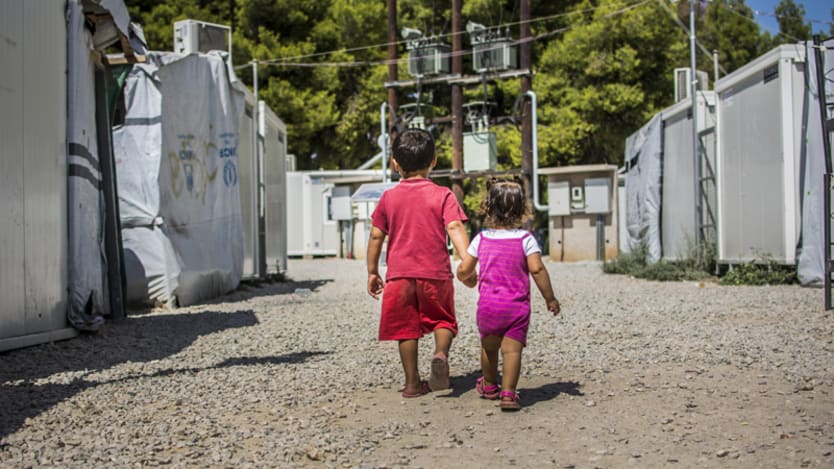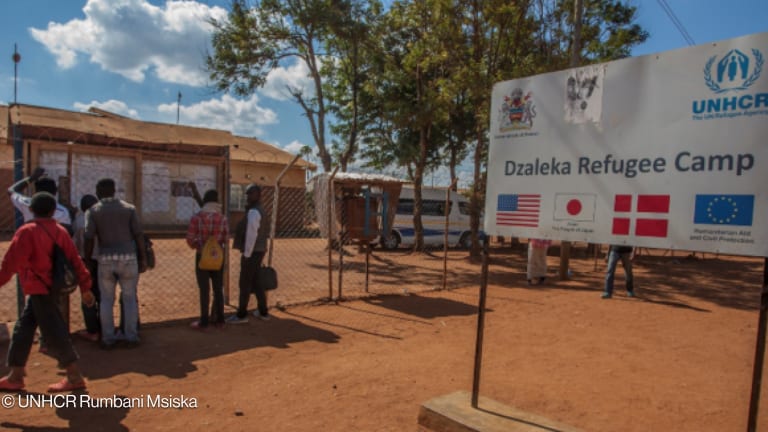
Earlier this month, the bodies of two children washed ashore on the Greek island of Lesvos, and Europe’s growing disregard for refugees at its borders was never more obvious. The coroner found that the two children had been dead in the water for 24 days, but no record of a migrant shipwreck or missing children’s report was ever filed by authorities for that period. What’s more, this horrific tragedy — which would have caused public uproar two years ago, when images of Alan Kurdi’s death first dominated headlines — attracted little to no attention at all.
Sadly, this is not the first time we’ve seen the protection of refugee children treated as a political afterthought in Europe. Since January, our emergency response team in Lesvos has seen almost 1,000 children arrive by boat to the north shore of the island, sometimes so scared and hypothermic that they lay limp in volunteers’ arms. Meanwhile, tens of thousands of young people remain stranded in camps on the islands and across mainland Greece, often in unsafe and inhumane conditions.
That’s why today, Universal Children’s Day and the anniversary of the Convention on the Rights of the Child, we call on Europe to uphold its responsibility to protect the rights of refugee children forgotten at its margins.
Since the Convention of the Rights of the Child was passed in 1989, governments have had a legal responsibility to create an environment that allows all children to reach their full potential. This includes their basic right to safe shelter, health, education, and free expression — regardless of their nationality or country of origin.
In theory, these rights should also apply to children stuck between governments, who have fled war and are stranded in a foreign country. In practice, that has been far from the case — leaving smaller NGOs to fill these gaps.
Basic rights are still unmet for refugee children stranded across Greece
The 19,000 children currently forced into international displacement across Greece see their basic rights violated on a daily basis. A recent Save the Children report found that conditions for children living on camps and detention centers on the islands are “abysmal,” with over-crowding compounding the poor sanitation, water shortages, and lack of safety in these settings. As winter draws in, the situation is only expected to get worse.
Conditions on some mainland camps are improving, but still too slowly. In Ritsona refugee camp where we operate, families now live in shipping containers provided by the U.N. Refugee Agency, which offer increased warmth and security compared to the flimsy tents they were housed in last winter. Significant improvements in access to basic health, sanitation, food, and water have also been made, with support from multilateral agencies and smaller NGOs.
Despite this, basic rights pertaining to the emotional health and psychosocial needs of refugee children are still chronically unmet. As service providers in Lighthouse Relief’s Child Friendly Space in Ritsona camp, we regularly encounter behavior tied to trauma, anxiety, and emotional dysregulation, likely linked to the loss of any sort of stable home environment. We see children as young as 9 years old express thoughts of self-harm, unsure how to vocalize or deal with their frustrations in a healthy way. Instead, they often expel these feelings through aggressive behavior or by being overwhelmingly sad, to a point where we can neither console nor reach them.
Through the Child Friendly Space, we offer activities to help foster their resilience and build supportive communities through structured games, crafts, and movement-based activities. For many children who grew up with war and forced displacement, this is their first playgroup experience.
However, responding to the psychosocial well-being of children requires sustained support that isn’t always available for a small NGO dependent on external funding. As donor interest and resources for the European refugee situation dwindle, so has our ability to fulfill our promise to remain in Ritsona camp for as long as we are needed. Yet, until governments are willing to step up to fill this gap in the long term, programs such as these remain vitally important.
Refugee children should have access to special rights — but these haven’t been upheld either
Article 22 of the Convention on the Rights of the Child calls for special rights for refugee children, including the right to asylum and family reunification. However, the question of who defends these rights in Europe is also becoming increasingly open to question.
Just two weeks ago, we filed a statement of concern regarding a pushback that took place on Greek waters near Lesvos. Shots were allegedly fired by Turkish authorities, and a number of families were separated. These reports add to the mounting evidence on illegal pushbacks and violence that put so many families at risk. To date, we have not received a response to our call for a thorough investigation into these incidents, which prevent men, women, and children from claiming their right to asylum.
Special rights to family reunification are also not being upheld in a timely way. In Ritsona camp, we’ve encountered many children and unaccompanied minors who have been waiting months, even years, to be reunited with parents or legal guardians elsewhere in Europe. Even after enduring the frustrating and overly complex process, reunification is not guaranteed.
When European countries fail to uphold their responsibilities, small NGOs like Lighthouse Relief become the main observers and advocates for the rights of refugee children. But without the sustained and full protection that only governments can provide, we know that this will never be enough.
On November 20, 1989, our forefathers backed the Convention on the Rights of the Child and rallied the world to do the same. Now, 28 years later, we must call on our leaders to renew these commitments and end the needless suffering of children at our borders.
Read more Devex coverage on the migration and displacement.





